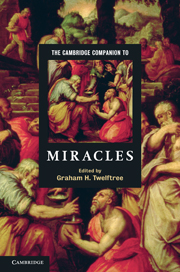Book contents
- Frontmatter
- Introduction
- Part I Fundamental issues
- Part II Miracles in antiquity and the Middle Ages
- Part III Miracles and major religions
- 9 Miracles in traditional religions
- 10 Miracles in Hinduism
- 11 Miracles in Islam
- 12 Tales Of Miraculous Teachings: Miracles In Early Indian Buddhism
- 13 Miracles in Christianity
- 14 Miracles in Jewish philosophy
- Part IV Miracle today
- Index
10 - Miracles in Hinduism
from Part III - Miracles and major religions
Published online by Cambridge University Press: 28 May 2011
- Frontmatter
- Introduction
- Part I Fundamental issues
- Part II Miracles in antiquity and the Middle Ages
- Part III Miracles and major religions
- 9 Miracles in traditional religions
- 10 Miracles in Hinduism
- 11 Miracles in Islam
- 12 Tales Of Miraculous Teachings: Miracles In Early Indian Buddhism
- 13 Miracles in Christianity
- 14 Miracles in Jewish philosophy
- Part IV Miracle today
- Index
Summary
Transposing a category such as ‘miracle’ that developed in the context of one tradition, namely Christianity, to the traditions of India is not an easy task. We need to ask questions such as what is served by such transposition, are there analogous categories in the traditions of India and, if there are, do they serve a similar function as the category ‘miracle’ in the West? We need therefore to read carefully across traditions in the service of comparison. Within Christianity and Western philosophy there are a number of understandings of what a miracle is. Hume defines miracle as ‘a violation of the laws of nature’ but in earlier centuries Aquinas defined it as a change in the natural order, something ‘sometimes done by God outside the usual order assigned to things . . . because we are astonished . . . when we see an effect without knowing the cause’. That is, a miracle is an event without a natural cause, whose cause is God and his ability and desire to disrupt the usual order of things. The concept of miracle therefore entails the concept of a law of nature. Transplanting this definition into India, it is not clear that Indian religions developed any concept directly akin to this although the Indian conception of astonishing or wondrous events is close to Thomas. There is an understanding in Indian religions from ancient times that the usual patterns of material causation can be changed. While at one level this is a disruption of natural causation, at another level it is in accord with natural law, with the law of the universe. Indeed, one of the signs of spiritual progress was understood precisely in these terms as an apparent disruption of material causation in the possession of supernormal powers. There are, then, two contexts which offer analogues to the Western category, namely the development of power in yoga that leads to various supernormal powers or accomplishments (siddhi), and the perception of the disruption of material causation in popular piety characterized by wonder (adbhuta).
- Type
- Chapter
- Information
- The Cambridge Companion to Miracles , pp. 184 - 198Publisher: Cambridge University PressPrint publication year: 2011
- 1
- Cited by



